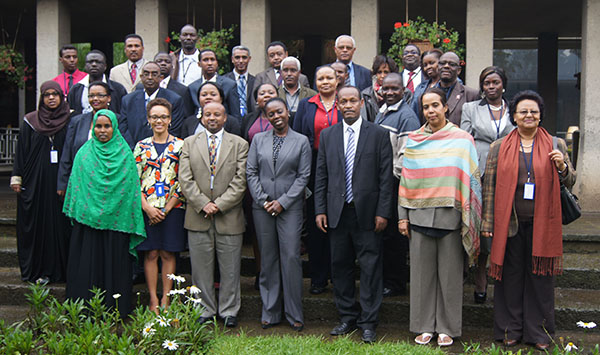 12th August 2014, Addis Ababa: IGAD in collaboration with the East and Southern African Regional Office (ESARO) of the United Nations Population Fund (UNFPA)has today convened the second meeting of the East, Southern and Horn of Africa (ESHA) Technical Working Group(TWG) on reproductive health commodity security in Addis Ababa.
12th August 2014, Addis Ababa: IGAD in collaboration with the East and Southern African Regional Office (ESARO) of the United Nations Population Fund (UNFPA)has today convened the second meeting of the East, Southern and Horn of Africa (ESHA) Technical Working Group(TWG) on reproductive health commodity security in Addis Ababa.
The three-day meeting will, among other issues, discuss prequalification of manufacturers and annual inspection; accreditation of laboratories; pre- and post-shipment testing of condoms; and tests conducted during quality testing of male and female condoms.
The group is made up of representatives of the Common Market for East and Southern Africa (COMESA), the East African Community (EAC), IGAD and the Southern Africa Development Community (SADC). Other group members include officials from the World Health Organization (WHO), the African Union Commission (AUC), the International Planned Parenthood Federation (IPPF) and the Population Services International (PSI). Also in attendance are some national regulatory agencies from the region.
During a brief opening ceremony, Mr. Meskel Lera, the Director General of the Pharmaceutical Funds and Supply Agency (PFSA) of Ethiopia commended the progress made to improve availability and utilization of reproductive health commodities in the entire region. Speaking on behalf of the Federal Ministry of Health, the Director General further commended the joint efforts of national governments, development partners, the private sector, the civil society and beneficiary communities.
“We need to identify and address the bottlenecks in the supply chain and utilization of the reproductive health commodities,” he challenged the members, adding that strong national ownership and leadership, as well as better coordination and partnership, among other things, are required from the supply side.
In conclusion, the Director General appealed for the documentation and scaling up of promising practices across the countries in the region, pointing out that the TWG meeting provides an opportunity to share lessons learned.
Reading a statement of the IGAD Executive Secretary, the Program Manager in charge of Health and Social Development at the Secretariat, Ms. Fathia Alwan, commended the efforts of the TWG in launching coordinated responses to major health and development challenges facing the region. She noted that the ESHA region is characterized by high disease burden including HIV/AIDS, unmet reproductive health needs and high maternal and infant mortality.
She further pointed out that the major drivers of these problems are diverse and complex. They include weak health systems, poor infrastructure and inadequate access to essential drugs including reproductive health commodities.
“This is why the working group chose reproductive health commodity security as one of its priority areas for collaboration and joint action,” said Ms. Alwan, expressing gratitude of IGAD for the honor to chair the group since its inception. She also thanked all the members including the partners for their trust and confidence in IGAD to lead the initiative.
Finally, the Program Manager invited TWG members to take an active part in the forthcoming first IGAD International Scientific Conference on Health to be held in Addis Ababa between 3rd and 6th December 2014.
On her part, Ms. Josiane Yaguibou, the UNFPA-ESARO Family Planning Policy Adviser called on the regional economic communities (RECs) to participate in all pre-qualification processes and involve their member states.
She urged them to strive to achieve accreditation of their laboratories as per international requirements, stressing the need for the RECs and the member states to have confidence in pre-shipment testing programs offered by UNFPA.
To ensure post-market surveillance guidance is observed, the Adviser proposed that member states institute post-marketing surveillance programs and the RECs should work towards establishment of reference condom testing laboratories.
“Member states should also institute operational research on quality assurance to inform policy, and strengthen in-country coordination and partnerships,” she added, emphasizing the need to improve the quality of warehousing and transportation conditions at all levels to maintain reputable supply chain management. ###